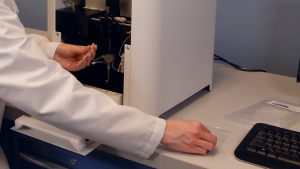
TUSCALOOSA, Ala. – Many pieces of equipment are critical for ensuring successful research at The University of Alabama. The Alabama Water Institute recently awarded $157,891.91 in multiple grants to AWI-affiliated faculty members to support their water-related research efforts. The grants are made available through AWI’s Equipment Support Program.
The AWI has provided the following funds to seven researchers through the program:
Dr. Steven Thomas, Bishop Professor of Aquatic Ecology in UA’s Department of Biological Sciences, was awarded $40,000 toward the purchase of a FlowCam 8000 with fluorometric detection. This equipment allows faculty to automate counting and identification of suspended particles, microplastics, algae and cyanobacteria, which opens a wide variety of proposal opportunities in an important, but understudied aspect of freshwater science. The FlowCam’s ability to identify and quantify microplastics may be one of the most important contributions given the global distribution of these emerging contaminants.
“AWI is dedicated to supporting cutting-edge research that improves our ability to understand, manage and restore freshwater ecosystems,” said Thomas. “Funds from this award will advance the nascent shared analytical facility being developed by the Center for Freshwater Studies by allowing UA faculty to explore the transport and fate of microorganisms, emerging contaminants and microplastics in freshwater ecosystems.”
Dr. Hazel Barton, Loper Endowed Professor of Geological Sciences, has received $35,000 toward the purchase of a high precision gas analyzer. The analyzer will be used to research microbial growth and respiration, particularly regarding the nitrogen cycle. It will be useful in numerous applications across campus, including groundwater analyses, soil geochemistry and climate change studies.
“This instrumentation will allow us to assist AWI in pursuing innovative research questions through a combination of geochemistry and geomicrobiology,” Barton said. “With the Picarro, we hope to test some of some of the more challenging questions regarding the unknown fate of nitrogen in karst systems.”
Dr. Michael McKain, associate professor of biological sciences, was awarded $26,721.91 to purchase an ultra-low temperature freezer. It will be used to maintain the large number of tissue, DNA, RNA and sequencing library samples being generated in AWI and CONSERVE Research Group-based projects. It will be used immediately in anticipation of producing thousands of samples over the next two years.
“Support from AWI enables us to grow the CONSERVE research group’s capacity to store and maintain diverse collections of biological specimens,” said McKain. “Our work, which focuses on exploring the genomics of biodiversity in watersheds, will provide novel insights into how water systems and the organisms that inhabit them interact to produce healthy ecosystems.”
Dr. Honsheng He, associate professor of computer science, has received $20,000 toward the purchase of a SATLAB fully autonomous echosounder boat. The boat will be used for autonomous bathymetric surveys and 3D reconstruction of underwater scenes while focusing on water volume estimation, which is of interest to the AWI and NOAA. The research will further support the mission of remote water quality inspection and sample collection.
“The equipment fund enables me to initiate the research of autonomous bathymetric and reconstruction and apply my expertise in robotics and machine learning to solve critical water problems,” said He.
Dr. Jonathan Benstead, professor of biological sciences, was awarded $16,870 for a microrespiromety system. The system includes computer software and hardware required for individual oxygen consumption rate measurements in small aquatic organisms, such as invertebrate or fish eggs, embryos, larvae or juvenile life-stages. Exploring the effects of higher temperatures on the metabolic rates of aquatic organisms is an increasingly important aspect of UA graduate students’ research activity.
“AWI’s help with purchasing this microrespirometer will greatly expand the scope of our work on metabolic rates of small organisms and how they are affected by temperature,” said Benstead. “In turn, the increased capability strengthens AWI’s commitment to global-change research.”
Dr. Benjamin Titus, UA assistant professor of biological sciences at the Dauphin Island Sea Lab, has received $15,000 toward the purchase of two Oxford Nanopore MinION Mk1C portable DNA sequencing platforms. These instruments enable real-time sequence data collection in the field, which will enable researchers to take them on research vessels and international field research expeditions to enable data collection in remote or offshore field localities. This will greatly enable the capacity of researchers to collect high-quality molecular data without the logistical burden of flash freezing samples in the field, storing at low temperatures, and transporting them back to UA and DISL.
“My research is focused on understanding the processes that generate and maintain marine invertebrate biodiversity, which is in line with AWI’s mission to promote research on the biodiversity of aquatic ecosystems,” Titus said. “As a field-heavy research program, one of the challenges we face is getting high-quality DNA preserved in remote localities, as well as the lag time between fieldwork and data generation. With this support from AWI, we will be able to solve both of these logistical challenges.”
Dr. Keivan Davami, assistant professor of mechanical engineering, was awarded $4,300 toward the purchase of an electropolishing machine. Davami recently acquired an X-ray diffraction tool for conducting residual stress measurements. To measure stresses at various depths, it is necessary to etch the surface to access the desired depth for the measurements. The electropolishing machine will be used for this purpose.
“My research focuses on various surface engineering techniques, and in particular, laser peening, which through its induction of compressive residual stresses, fortifies materials against fatigue and mechanical challenges,” Davami said. “This process indirectly enhances corrosion resistance by impeding crack initiation and growth on the material’s surface. Developing materials with higher resistance against corrosion benefits the work of AWI.”
For more information about how to apply for AWI support programs and for deadlines, contact Stefanie O’Neill at soneill2@ua.edu.
Brock Parker, Multimedia Specialist and Writer, Alabama Water Institute, brockparker@ua.edu